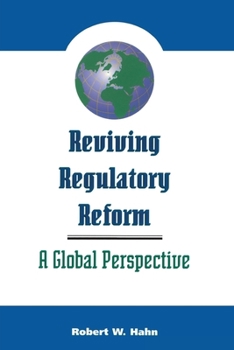Reviving Regulatory Reform
This pioneering study uses the latest available data to examine the internationalization of regulation and regulatory reform.
Format:Paperback
Language:English
ISBN:0844741221
ISBN13:9780844741222
Release Date:January 2000
Publisher:AEI Press
Length:136 Pages
Weight:0.42 lbs.
Dimensions:0.3" x 6.0" x 9.0"
Related Subjects
Business Business & Investing Economics Political Science Politics & Social SciencesCustomer Reviews
1 rating
Less regulation => more growth
Published by Thriftbooks.com User , 21 years ago
This was published in 2000, in what we now know as the last leg of the longest expansion in US history. During which, the ideological push for deregulation grew hugely. The book reflects this, and indeed Hahn and the American Enterprise Institute from which he hails probably played no small part in this. The book's arguments are well marshalled, and can be summarised simply as stating that a cost effective way for an economy to grow is by reducing the amount of government regulation in various industries. Hahn does not confine his arguments to the US. Indeed, half the book describes the impact on the developing world, where the need for growth is far more acute, due to burgeoning populations, subsections of which subsist at very minimal levels. Empirically, the massive growth of Chinese manufacturing and Indian information technology has been attributed in no small part to their governments reducing regulations.For the US, Hash predicted that some industries like telecommunications and electricity would deregulate slowly, due to their complexity. He specifically cited these two! From the perspective of three short years later, and the scandals of WorldCom and Enron, you could suggest that a hasty deregulation might have costs of its own. And that deregulation does not necessarily mean less government monitoring of industries.






